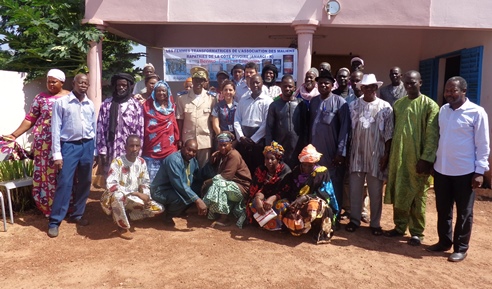Brazil and Mali share experiences on peanut farming
Brazil and Mali share experiences on peanut farming
With the aim of exchanging experiences on peanut farming and discussing the importance of Good Agricultural Practices (GAP) to reduce grain contamination by aflatoxin, Embrapa researchers participated in a technical mission in Mali. The exchange, which took place mid-September in the cities of Bamako and Kita, major peanut-producing regions in the country, provided the interaction between researchers, family farmers (leaders), professionals from several areas, postgraduate students, and representatives of governmental and non-governmental institutions.
The activity is part of the project run by Embrapa and the University of Science, Techniques and Technology of Bamako, "Transfer of peanut production technologies generated by Embrapa for adoption by family farmers in Africa (Aflamali)", which is part of the Africa-Brazil Agricultural Innovation Marketplace and has the aim of fostering development in African countries through Embrapa's technical-scientific support. The schedule included a workshop, meetings and technical visits to peanut production areas.
During the workshop, the researcher from Embrapa Acre, Cleísa Cartaxo, leader of the project in Brazil, gave the lecture "Peanut production and the issue of aflatoxin contamination", a factor that hinders the development of the crop in Mali, causing damages for growers and to the population's health. "Peanuts are among the most consumed foods in the country, hence the importance of raising awareness among the actors of the production chain. The expectation is that activities developed within the scope of the project contribute to solving the problem", she comments.
"Good Agricultural Practices and aflatoxin control in the peanut production" were the subject of the lecture by the researcher from Embrapa Cotton, Tarcísio Gondim. "The adoption of GAPs involves the process of crop implementation, which starts with the choice of the area and ends with the harvest.When such procedures are adopted, they contribute to reducing aflatoxin levels and increasing production", he explains.
Gondim stresses the importance of the work in the area of peanut genetic improvement conducted by the International Crops Research Institute for the Semi-Arid Tropics (ICRISAT-Mali). "In addition to their excellent physical and logistic structure, the institute has an experimental peanut crop area, and their breeding program has 165 accessions, nine of which are promising genotypes, with different levels of resistance to the fungi that cause aflatoxin. An experience that can bring benefits for Brazilian farmers," he adds.
Scientific cooperation
Peanut contamination by aflatoxin harms the entire production chain. Malian growers are not able to export the product due to the fact that grain contamination levels exceed the maximum required for trade in the European market, restricting product sales to the domestic market.
To seek a solution for the problem, researchers from the University in Bamako are working on the formulation of a biopesticide to control aflatoxin producing fungi. The product is at test stage, and has shown efficiency in controlling the proliferation of the fungus and, consequently, of the toxin. According to the researcher Amadou Babana, leader of the project in Mali, the use of the biopesticide allied to GAPs will be incorporated to sustainable peanut production practices to be disseminated to local growers.
The scientific cooperation between the countries also involves the elaboration of a manual for family farmers from Brazil and Mali on Good Agricultural Practices on peanut cultivation. Besides Portuguese, the material will also be published in French and Bambara, languages spoken in the country.
Last May, Malian researchers made a technical visit to Embrapa Cotton's Experimental Field in Barbalha-CE and to family farming areas in the outskirts of Crato-CE to see peanut crops. They also participated in a capacity-building event at Embrapa Food Technology, with a focus on the identification of fungi and analysis of aflatoxin quantification.
In Acre, peanut stands out as a source of protein in the diet of indigenous peoples. The teaching-learning experience provided by the project will be the foundation for the work that will be held in the Kaxinawá Indigenous Land in Nova Olinda through the project "Ethnoknowledge and Agrobiodiversity among the Kaxinawá from Nova Olinda", executed by Embrapa Acre and partners.
Translation: Mariana de Lima Medeiros
Mauricilia Silva
Embrapa Acre
Press inquiries
acre.imprensa@embrapa.br
Phone number: (68) 3212-3225
Further information on the topic
Citizen Attention Service (SAC)
www.embrapa.br/contact-us/sac/

